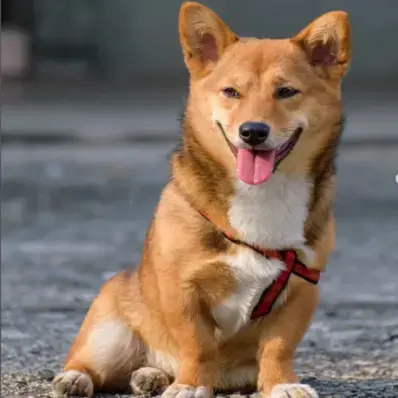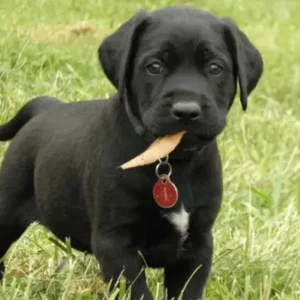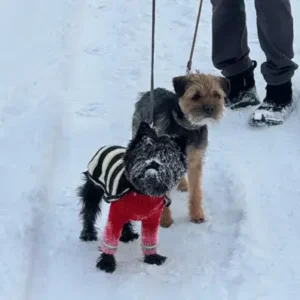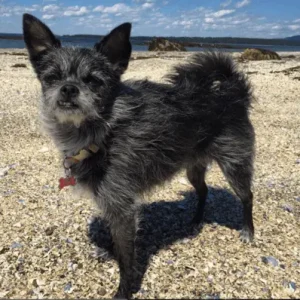Corgi Inu History/Origin
The Corgi Inu hybrid dog breed may have developed naturally over time, but designer breeders likely began intentionally crossing Corgis and Shiba Inus in North America during the early 2000s. TheShiba Inu, known for its ancient lineage and independent nature, was paired with the sociable Corgi to create a friendly, fox-like companion.
Corgi Inu Personality
Corgi Inus is one of the dog breeds that has dynamic personalities that blend the playful and outgoing nature of Corgis with the more reserved temperament of Shiba Inus. They are known for being affectionate and loyal to their families, forming strong bonds with a few select individuals.
This mix makes them excellent companions, as they are both alert and protective. They also inherit the guarding instincts of their parent breeds.
- Potential Challenges
Despite their smaller size, Corgi Inus are full of energy and require significant mental and physical stimulation. If their needs are not met, they might become mischievous or attempt to push boundaries.They crave attention and can thrive in households with other pets.
However, it’s essential to make sure they get enough interaction and engagement. Without it, they may develop behavioral issues. If you’re seeking a lively and protective companion with a charming personality, a Corgi Inu might be the perfect fit for you!
Corgi Inu Physical Appearance
Corgi Inus are characterized by their short, sturdy bodies with stubby legs and a curled tail that can be either long or short. Their fox-like appearance features a pointed muzzle, upright ears, a black nose, and dark brown eyes, giving them a playful and charming look that often seems to convey a smile.
- Size
Since the Corgi Inu is a relatively new hybrid, there aren’t many established standards for its size. However, being a mix of the Corgi and Shiba Inu, they generally fall within the medium range. Most Corgi Inus weigh between 17 and 27 pounds and stand about 9 to 15 inches tall at the shoulder, though individual dogs may be smaller or larger depending on their lineage.
- Coat color
Corgi Inu coats typically combine traits from both their Corgi and Shiba Inu parents, displaying a range of colors like red, black, blue, fawn, white, and sable. Their coats can be either solid or feature a mix of colors, such as brindle or pied patterns. Generally, these dogs have long, dense fur. While Shiba Inus are known for their double coats, Corgis have shorter, thick, waterproof coats, adding to the variety in their offspring’s appearance.
Fawn Corgi Inu- Source: corgi_inu_kohaku
Sable Corgi Inu- Source: corgi_.inu
Corgi Inu Gender Differences
Male Corgi Inus are generally a bit larger and stockier than females, who tend to be more slender. Males may be more playful and energetic, while females might show a bit more independence. However, temperament and behavior largely depend on individual upbringing and training rather than just gender.
Corgi Inu Feed/Nutrition
A Corgi Inu’s diet should include meat, bones, organs, and a small amount of plant ingredients, as these provide essential vitamins and minerals. A raw diet typically has about 70% water, keeping them well-hydrated. Since they are a high-energy, small breed, their diet should match their activity levels.
Be cautious about overfeeding, as Corgi Inus can easily gain weight. Stick to a regular feeding schedule, limit treats, and consult your vet as their dietary needs will change from puppyhood through their senior years. Cucumbers are a healthy, low-calorie treat that can be given in moderation, helping to satisfy their snack cravings without adding excess calories.
Corgi Inu Health
The Corgi Inu breed can inherit health conditions from both the Corgi and Shiba Inu. While many are generally healthy, it’s important to watch for specific issues. Regular veterinary checkups and proper care are key to keeping them in good shape.
- Cataracts: Cataracts cause clouding of the eye’s lens, leading to blurry vision or blindness. It often develops in older dogs. To help prevent cataracts, regular eye exams and a healthy diet rich in antioxidants are important, and early detection can allow for surgical intervention if necessary.
- Elbow Dysplasia and Hip Dysplasia: These are joint conditions where the bones don’t fit properly, causing pain and leading to arthritis. Maintaining a healthy weight, providing regular exercise, and using joint supplements like glucosamine can reduce the risk or severity of this condition. Early detection through vet screenings can also help manage symptoms.
- Degenerative Myelopathy: This is a progressive spinal cord disease that can cause weakness and paralysis in the hind legs. While there’s no cure, maintaining your dog’s muscle strength through low-impact exercises, along with regular vet checkups, can help slow down the progression.
Corgi Inu Care and Grooming
Corgi Inus need regular exercise to maintain their high energy levels and avoid weight gain. Aim for at least 30 to 60 minutes of walking daily, combined with playtime and shorter walks to keep them active and healthy.
For grooming, check their ears daily for debris or pests, and clean as directed by your vet. Trim their nails once or twice a month, or when they begin clicking on the floor. Regular brushing is essential for their dental health, as both parent breeds are prone to periodontal issues—daily brushing is ideal.
Corgi Inus shed heavily, so daily brushing is necessary to manage their fur. They thrive in colder climates due to their thick coats but can struggle in extreme heat. Always avoid exposing them to any extreme weather, regardless of their coat. Additionally, training your dog not to bark can help maintain peace, especially during playtime or when they’re excited about outdoor activities.
Corgi Inu Rescue Groups
If you’re considering rescuing a Corgi Inu, it’s a wonderful way to give a dog a second chance at a loving home. Be sure to check breed-specific rescue groups, as they may have Corgi Inus or similar mixes available for adoption. These groups often specialize in the breed, making it easier to find the right match for your family while also supporting rescue efforts.
Corgi Inu Price
The price of a Corgi Inu typically ranges from $500 to $2,000, depending on factors such as breeder reputation, pedigree, and location.
When purchasing a Corgi Inu, it’s essential to find a breeder who follows ethical practices. Look for breeders who prioritize the health and well-being of their dogs, conduct health screenings, and provide a clean, caring environment. Avoid breeders that engage in irresponsible practices like puppy mills.
Interesting Facts
- Corgi Inus often inherit their parents’ vocal traits, making them quite talkative. They may “talk” with unique sounds, expressing their excitement or alerting you to visitors.
Best For
Corgi Inus make excellent pets for active individuals or families who can provide plenty of exercise and mental stimulation. Their friendly and alert nature makes them suitable for singles living in urban areas, seniors who can engage them with play, or families with older children who understand how to interact with dogs. Proper socialization and training are key to ensuring they thrive in any home environment.
Top Names
| Male Corgi Inu Names | Female Corgi Inu Names |
| Max | Bella |
| Rocky | Luna |
| Finn | Daisy |
| Thor | Zoe |
| Milo | Ruby |









 Shiba Inu- Source:
Shiba Inu- Source:  Corgi – Source:
Corgi – Source: 

 Fawn Corgi Inu- Source:
Fawn Corgi Inu- Source:  Sable Corgi Inu- Source:
Sable Corgi Inu- Source: 







